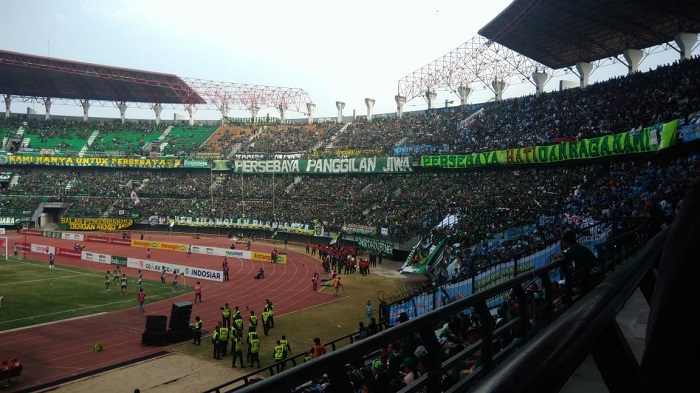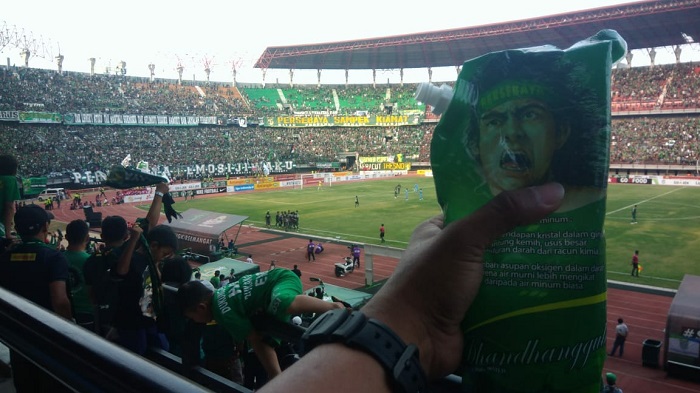Fajar Junaedi
Versi Bahasa Indonesia
Thousands of fans of Persebaya, a legendary football club from Surabaya in East Java, are on their way to Bandung in West Java to arrive by 8 January 2017. Not all of them are Surabaya natives, many of them hailing from a number of other cities in Indonesia. They have but one objective: to fight for the reinstatement of Persebaya’s membership of the Football Association of Indonesia (PSSI), at the PSSI Congress.
I departed Yogyakarta on 7 January 2017 at 9pm with one chapter of the Persebaya supporters group, Bonek. These members had gathered from Yogya and surrounding areas. A large 50-seater bus had been organised for the group and every single seat was occupied. Some Bonek members even brought their children along. There were two children under five years old in this group traveling to Bandung.
Originally, I had heard that the bus was full. I had almost given up hope and was trying to get a train ticket. Unexpectedly, the day before we were scheduled to leave, there was good news. One of the Bonek members had cancelled due to work commitments. Tulus Budi, a man from Surabaya who had been a Bonek supporter since the 1980s, informed me of this via WhatsApp.
I had known Tulus Budi for quite some time and his love for Persebaya was unshakeable. He had supported them through their prime in the ‘80s, ‘90s and early ‘00s, and also during their downturn from 2012 to 2017. “Believe in the truth and never give up,” he said of his motivation for backing Persebaya.
He sat in the very front seat with his wife. Beside him sat Anom Hafid, a younger Bonek member. With others of his generation, Anom Hafid had initiated the establishment of Green Noord, a raucous branch of Bonek who would occupy the northern stands of the Gelora Bung Tomo stadium, Persebaya’s home ground. Green Noord were known for their very vocal support of Persebaya, as well as their criticism of Persebaya’s management whom they viewed as incompetent.
We embarked on our journey into the night and the trip went smoothly. It took about 10 hours from Yogya to Bandung, passing through towns in the Special Region of Yogyakarta, and the provinces of Central Java and West Java. The bus stopped twice so that passengers could eat and pray. Local residents in the towns we passed through greeted us enthusiastically and every other bus we passed waved in support.
Persebaya’s relegation
For five years, Persebaya, established in 1927, had faced injustice from the PSSI. The national body ceased to recognise the club in 2012 as a result of its resistance to PSSI policy. The start of the injustice surrounded a 2010 play-off match between Persebaya and Persik Kediri when both clubs, along with Pelita Jaya, were at the bottom of the Indonesian Super League ladder. This match would decide which of the three clubs would be relegated to a minor grade.
Ultimately, the PSSI unilaterally declared the match won by Persik Kediri, 3:0. This score resulted in the relegation of both Persebaya and Persik Kediri as they were left with fewer points than Pelita Jaya on the table. Pelita Jaya is owned by the Bakrie family, a dominant family in PSSI leadership who are supported by the Golkar party. Rather than acquiesce, Persebaya fought the decision as they believed the scheduling of the match had been unfair.
On the original scheduled date, 29 April 2010, Persebaya arrived at Brawijaya Stadium in Kediri, East Java, but the match was cancelled because a license had not been granted by police. It was then rescheduled for 6 May at Mandala Krida Stadium in Yogyakarta. Persebaya arrived there, with Bonek to support them, however once again the match did not take place. The referee granted a 3:0 victory to Persebaya in accordance with the rules because Persik, still the host regardless of the venue change, failed to hold the game.
Unexpectedly, the PSSI revoked the referee’s decision, introducing a new policy and again rescheduled the match, to be played back at Brawijaya Stadium in Kediri on 5 August. Spreading the news via text message, Bonek descended on Kediri in huge numbers, however, the match was cancelled once again. Persebaya should have been declared the winner because the host team Persik had failed to hold the match. Instead, the PSSI made the controversial decision to reschedule the match for 8 August at Gelora Sriwijaya Jakabaring Stadium in Palembang, Sumatra. Dissatisfied with PSSI’s decision, Persebaya refused to play and, as a result, were penalised by the PSSI and forced to relegate.
Persebaya decided to withdraw from the Indonesian Super League (ISL) and join the Indonesian Premier League (LPI). The club’s ongoing conflict with the PSSI attracted a great deal of attention in the Indonesian football scene. Internal conflict broke out within the PSSI following Persebaya’s shift to the Premier League, creating division on the PSSI board. The government intervened, suspending the PSSI, though unfortunately Persebaya’s unrecognised status continued.
Bonek versus the PSSI
“We are fighting for Persebaya’s honour. We demand that Persebaya is recognised. We’re sick of being lied to by the PSSI,” Anom said to me about Bonek’s ultimate objective.
Since the events of 2010, Bonek has opposed the PSSI. The association once tried to subdue Bonek by creating a new ‘Persebaya’ team, but that team was rejected by Bonek. No more than 500 fans would attend the ‘Persebaya’ matches, whereas the real Persebaya would get 50,000 Bonek members into Gelora Bung Tomo Stadium. I once went to one of the ‘Persebaya’ matches against Persiram Raja Ampat at Maguwoharjo Stadium in Yogyakarta. There were no more than 200 fans of the new team in attendance and their presence was no doubt organised by the PSSI. Most Bonek members boycotted ‘Persebaya’ matches and continued to fight for the reinstatement of the real Persebaya. A police officer working at the match asked me, “Is this really Persebaya? Why are there so few fans?” I explained to him that this ‘Persebaya’ was created by the PSSI to edge out the original team. “I like Persebaya,” responded the police officer, “they are a legendary club and their fans are quite fanatical. Hopefully Persebaya will rise again.”
The PSSI decided to test Bonek’s strength by holding their congress in Surabaya on 26 January 2014. Thousands of Bonek members demonstrated outside the Shangri-La Hotel where the congress was held. They demanded Persebaya’s reinstatement, and though they didn’t achieve that, they successfully disrupted the event.

The Bandung parade
On Sunday 8 January 2017 at 8am, our bus entered the city of Bandung. Originally, the bus was going to park at the Pajajaran Sports Centre, which was to be the Bonek meeting point, though some on our bus had the forethought to ask the driver to continue on to the city square. Tulus Budi made contact with the Bonek members already in Bandung. The concern was that if we parked at the sports centre, a police blockade could have stopped us from heading to the Aryaduta Hotel where the congress was being held.
Eventually our bus arrived at Bandung’s city square where thousands of Bonek members had begun to assemble. Tulus Budi gathered in the corner of the square with some of the Bonek leaders from other cities to discuss the action plan. At 10:30am, the crowds began to make their way to Aryaduta Hotel on foot. Flares illuminated the streets along the way. Bonek filled the air with a loud and unrelenting chorus, and waved large flags. Along the way, the people of Bandung waved at us in welcome. I had lost sight of Tulus Budi and Anom Hafid, who were in the front line of the parade.
I was at the back end of the huge parade with members from Surabaya, Jakarta and Yogyakarta. One of them I already knew: Andhi Mahligai, a respected and active Bonek member in the Jakarta area. Walking at the back, we collected rubbish left behind by the large group in front of us. Much of it was burnt out flares that were too hot to touch. We had to douse them with water so that we could put them in the garbage bags.
For almost two hours, the Bonek parade travelled from Bandung’s city square to the Pajajaran Sports Centre, as the group from Yogyakarta mingled with thousands of other Bonek members. The thousands who had walked from the city square were met with thousands more at the sports centre. Before we had begun to move towards our final destination, the Aryaduta Hotel, good news arrived. Persebaya was to be reinstated by the PSSI.
At the Pajajaran Sports Centre, Bonek members wept tears of joy. Bonek had finally won their battle with the PSSI. A group of football fans had claimed victory over a football federation.
In the late afternoon, we gathered again in the Bandung city square. With sunset approaching, our bus began its journey back to Yogyakarta.
Fajar Junaedi (fajarjun@gmail.com) is a lecturer in Communications at Universitas Muhammadiyah Yogyakarta and a researcher of football fans.
English translation by Abby Witts (abby.witts@flinders.edu.au), College of Education, Psychology & Social Work, Flinders University.
